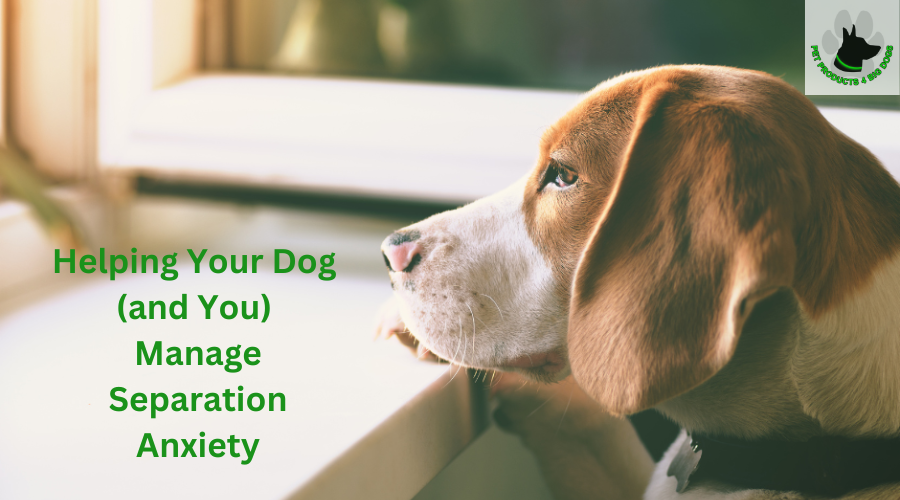We love our big dogs and when we’re separated it can cause anxiety for both you and your pet. Some dogs are better than others, but I believe a bit part comes with conditioning your dog and starting from a reasonably early age to leave them alone.
Here are my top tips to manage anxiety for them (and a little for you):
Start early, but gradually.
Raising dogs isn’t that much different from raising kids. When I initially left my children home alone (at a suitable age!) I started with very little time spans. Perhaps a quick half hour. Then after a few times, it would be 2 hours and eventually after a good period of time I would leave them alone all day (but yes, I did often ring in and check everyone was good). Similar for your dog (minus the phone in call). Start with short times and then build them up gradually. In time, our pets learn patterns and will cope quite well. When I first went on holidays and left Caesar home he was distressed all week. My adult children were with him, but he really didn’t cope. But after 3 or 4 holidays he was much better. Now he shows no anxiety at all.
Ensure they have things to keep them occupied (and lots of fresh water!)
Having their ‘toy box’ with things to do will help keep them out of mischief; especially the younger dog who might get bored quite quickly. I know some dog owners who leave the TV on for their dogs, or some relaxing music. I’ve also heard that audio books are great; that sound of a human voice speaking can be very calming. Having some try biscuits in a Kong will provide food and something to keep them busy. Alternatively, a frozen treat might occupy them for a while, although in Queensland’s summer, possibly not too long.
When you’re leaving there are two things to not do - don't sneak out and don't make the goodbye emotional.
The first is don’t just sneak out. They wonder where you are and get distressed trying to find you. You just disappeared!!!! On the other end of the spectrum, don’t make the goodbye (or hello) a huge emotional thing. “Mummy loves you!!!” and making it all emotional. Dogs (like horses) are very intuitive, so if you seem upset or distressed, they will pick up on that very quickly. When I walk out the door with any of my dogs, it’s always a positive and quick goodbye, something along the lines of “See you Caesar, I’ll be back soon.” and smile and leave. Be assertive and don’t drag it out – you don’t do them any favours by lingering and you don’t do yourself any favours. They know you’re gone, they know you’ll be back and it’s ok. An interesting fact is that the average dog learns 200 human words – so try to be consistent with your wording, but also be positive and calm in your manner.
Upon returning, don’t ‘wind them up’.
Greet them, be happy, give them a pat and rub around the neck, but don’t allow jumping. If you accept it for yourself, you’ll be teaching your big dog to jump at anyone who enters your home.
Talk to your vet.
If your dog is really struggling with anxiety, then talk to your vet. There are a number of medications and natural supplements on the market, but do ensure they are the best option in your case.
Exercise is always a great cure for separation anxiety.
But I do suggest you mix it up. If a walk is always followed by you leaving, they may start to associate the negative. Try walks when you get home also.
Train your dog.
Remember that training classes give dogs the tools and skills to manage various situations. Training teaches you what is best to be done, and gives your pup the education on how to be a good dog and behave – which in turn helps in every aspect of their life, including being left alone.
Technology can give you peace of mind.
Some pet parents cope better knowing what their dog is up to when they are away. Some cameras even have voice functionality in it. My son did that with Theo which honestly, did confuse the dog because he seriously couldn’t work out where Dan was.
If the situation warrants it, you may even consider a companion for your dog.
As we know, dogs are pack animals and don’t do well in isolation. If you know you’re away from home most of the time and have a very social weekend (which is not pet friendly) then you may not choose to have a dog. However, situations change and whilst you may have been working home-based when you chose your dog, but now have to work onsite, then a mate for your dog may be in order. Naturally consider all the other factors of having another dog – space, cost, time for care and whether your existing dog is likely to welcome a new member to the family.
Reiterating, start good habits early, wean them into you going out by starting with small blocks of time and make the departure and arrival calm and pleasant. I hope you (and your pet) will feel a little less anxious after you’ve been able to implement some of these strategies! :)

